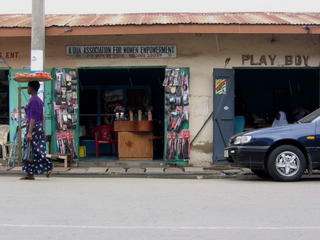Leaving Ghana
I want my last post to be about my Africaness, and not necessarily about anything from this trip. My blood, my face, and my name are part African, and I've always (even when I've heard degrading comments about the continent) been very proud of that.
My Blood
I have more family in Ghana than anywhere in the world. I probably have more family in Koforidua than anywhere in the world. I met relatives on this trip who I didn't know I had, and whose names I won't remember. In Ghana, every relative becomes your brother, or sister. It's kind of cool (except when they remember me, but I have no idea who they are).
I also recently learned that I probably have "brothers" and "sisters" in Winneba and Anomabu (although I didn't meet any of them). Having blood-roots is a cool thing; having blood roots all over southern Ghana is even cooler.
My Face
I've always thought I looked more like my mother than my father, so it surprised me the number of times people said I looked like my father (someone even mentioned how my toes look like my father's, because they point up). I found myself looking at a picture of myself and saying "I kind of look like my dad in this picture".
It has been hard to convince people here that I am African. I've had people tell me I was lying, after I told them I was born in Nigeria (why would anyone lie about being born in Nigeria - some Nigerians don't admit to being Nigerian).
I still think I look more like my mother than my father, and I know I have Africa in my face.
My Name
"Kodwo-Kodwo". This is a common greeting from my older sister. Growing up in Nigeria, everyone called me by my middle name, Kodwo (pronounced sort of like kuudjo). On my very first day of school, we were asked to write our names, and I wrote "Kodwo". The teacher got mad at me for not writing Jefferson (which I don't think I even knew how to spell at the time).
I still feel more like a Kodwo than a Jefferson (or a Jeff). Jefferson has always felt like a title to me, more than a name. I use Kodwo in everything (several email addresses and my license plate come to mind). I would go by Kodwo more, but I find that almost no one I've met in the U.S. can pronounce it to my satisfaction.
I've enjoyed going through this trip, responding to the question "what is your name?" with the answer "Kodwo".
Final Thoughts
I realize this is the 11th time I have "left" Africa. We came to the U.S. every other year in my childhood, and I've been back to Africa several times since moving out of Nigeria.
Leaving Africa is difficult, because on one hand I feel like this is home, but on the other, I feel like this is not where I belong anymore. Even though I leave Africa, I never really leave Africa.
I would like to end my post with a quote by Ken Wiwa. The quote is from a wonderful book, In the Shadow of a Saint (it's on our bookshelf, if anyone wants to read it) about his father, Ken-Saro Wiwa, who was a Nigerian political dissident, executed in 1995. I think this quote helps describes how I feel about leaving, and how I feel about my Africaness.
"I can never leave Africa. It is in my blood, in my face, in my name."











